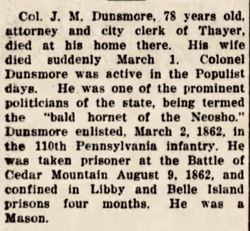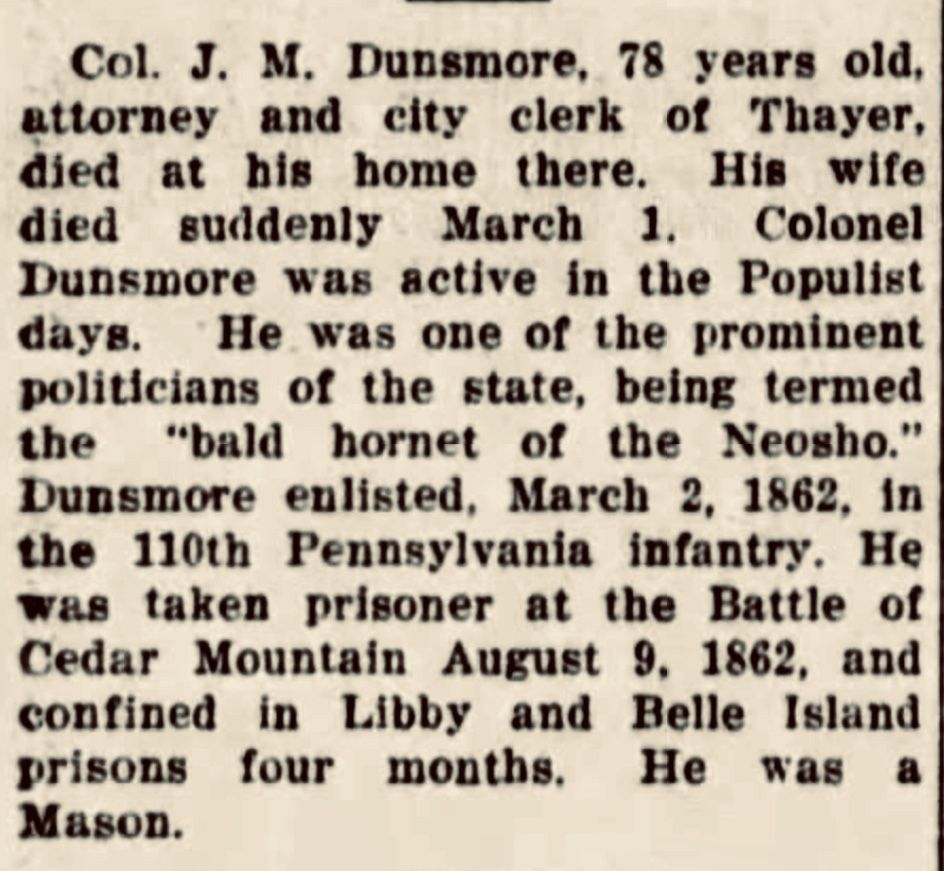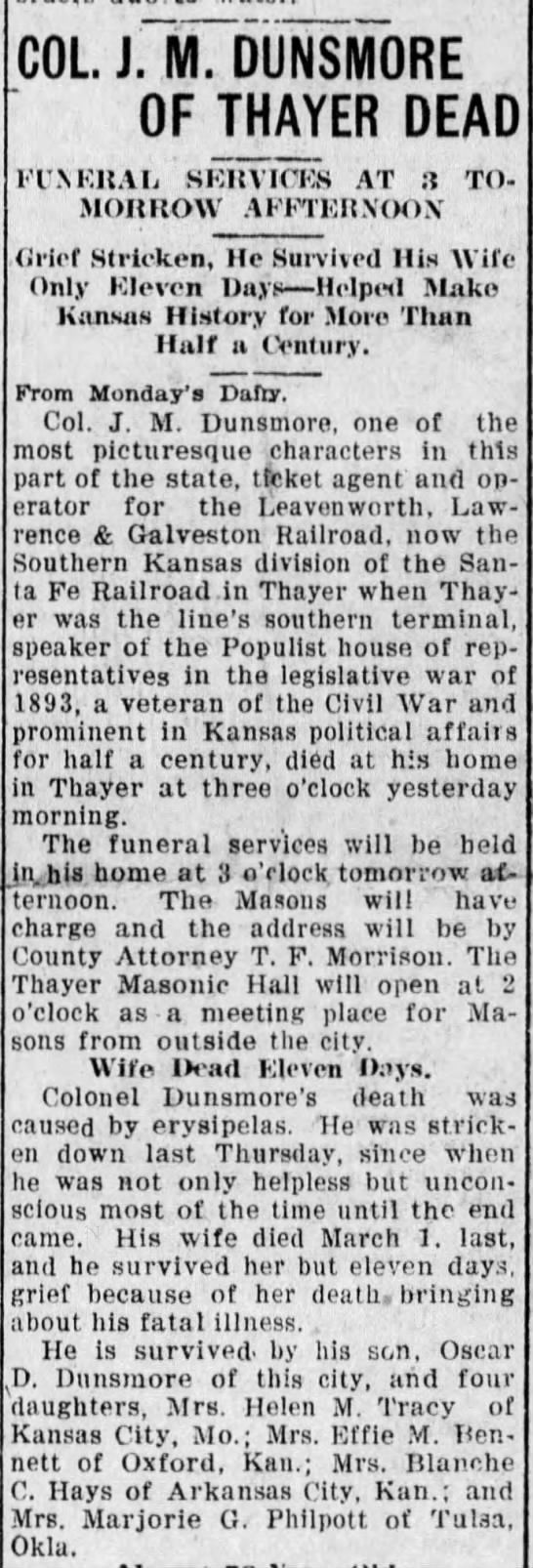CO. E, 110th PA. INF.
b. Apr. 25, 1844
d. Mar. 12, 1922
~His father, Robert W. Dunsmore, was a soldier in two wars, the Florida Indian war and the Civil War. In the latter he was a bugler in Company K of the Seventh Pennsylvania cavalry and was with Buell on his retreat from Tennessee. He is among the missing of the war.~
Colonel Dunsmore enlisted March 2, 1862, in Company F of the 110th Pennsylvania volunteer infantry.
He served under General Shields in the valley of Virginia and afterward in the Third and Second Army Corps. At the time of his discharge he was serving in the Army of the Potomac.
He took part in the battle of Winchester March 23, 1862; Port Republic June 9, and Cedar Mountain August 9, when he was captured while on a detail reconnoitering the enemy's lines. He was also confined in Belle Isle, being exchanged in time to take part in the battle of Fredericksburg in December, 1862.
Following this came Chancellorsville May 2 and 3, 1863, and Gettysburg July 2 and 3, then the Campaign of the Wilderness with the third division, Hancock's corps, from May 5 to 7 1864, Spottsylvania May 12, Cold Harbor June 1, the siege of Petersburg from the night of June 15 to October 27 and the battle of Hatcher's Run, where he was wounded.
He was discharged May 3, 1865, eight days after his twenty-first birthday. In all his service covered a period of three years, two months and one day.
In 1889, when his regiment dedicated its monument on the battlefield of Gettysburg, he was invited to deliver the oration, and did so, an honor rarely conferred upon a private soldier.
Following the war he attended the Quaker City College in Philadelphia and the Maryland Institute in Baltimore. He had learned telegraphy in the fall of 1864, while lying wounded in a hospital in Fairfax, VA. While he was lamenting the fact that he had no trade and that the prospects for him would be gloomy after his discharge from the army, a roommate, who was a military telegraph operator, suggested telegraphy.
That night Mr. Dunsmore took his first lesson using a jackknife for a key. In about six months after his discharge the following May he had become a fair operator and during the following three years he worked in and about Baltimore, Md., mostly in connection with stock exchange business.
He then worked a while for the Baltimore & Ohio railroad before coming to Kansas.
He read law as his duties to the company permitted and in August of 1872 was examined by a committee consisting of Col. C. J. Peckham of Sedan, Col. A. M. York of York Pomeroy fame and George R. Peck, afterward attorney general for the Santa Fe.
Just ten years after his first day in Libby prison he began the practice of law.
CO. E, 110th PA. INF.
b. Apr. 25, 1844
d. Mar. 12, 1922
~His father, Robert W. Dunsmore, was a soldier in two wars, the Florida Indian war and the Civil War. In the latter he was a bugler in Company K of the Seventh Pennsylvania cavalry and was with Buell on his retreat from Tennessee. He is among the missing of the war.~
Colonel Dunsmore enlisted March 2, 1862, in Company F of the 110th Pennsylvania volunteer infantry.
He served under General Shields in the valley of Virginia and afterward in the Third and Second Army Corps. At the time of his discharge he was serving in the Army of the Potomac.
He took part in the battle of Winchester March 23, 1862; Port Republic June 9, and Cedar Mountain August 9, when he was captured while on a detail reconnoitering the enemy's lines. He was also confined in Belle Isle, being exchanged in time to take part in the battle of Fredericksburg in December, 1862.
Following this came Chancellorsville May 2 and 3, 1863, and Gettysburg July 2 and 3, then the Campaign of the Wilderness with the third division, Hancock's corps, from May 5 to 7 1864, Spottsylvania May 12, Cold Harbor June 1, the siege of Petersburg from the night of June 15 to October 27 and the battle of Hatcher's Run, where he was wounded.
He was discharged May 3, 1865, eight days after his twenty-first birthday. In all his service covered a period of three years, two months and one day.
In 1889, when his regiment dedicated its monument on the battlefield of Gettysburg, he was invited to deliver the oration, and did so, an honor rarely conferred upon a private soldier.
Following the war he attended the Quaker City College in Philadelphia and the Maryland Institute in Baltimore. He had learned telegraphy in the fall of 1864, while lying wounded in a hospital in Fairfax, VA. While he was lamenting the fact that he had no trade and that the prospects for him would be gloomy after his discharge from the army, a roommate, who was a military telegraph operator, suggested telegraphy.
That night Mr. Dunsmore took his first lesson using a jackknife for a key. In about six months after his discharge the following May he had become a fair operator and during the following three years he worked in and about Baltimore, Md., mostly in connection with stock exchange business.
He then worked a while for the Baltimore & Ohio railroad before coming to Kansas.
He read law as his duties to the company permitted and in August of 1872 was examined by a committee consisting of Col. C. J. Peckham of Sedan, Col. A. M. York of York Pomeroy fame and George R. Peck, afterward attorney general for the Santa Fe.
Just ten years after his first day in Libby prison he began the practice of law.
Family Members
Sponsored by Ancestry
Advertisement
Records on Ancestry
Advertisement













